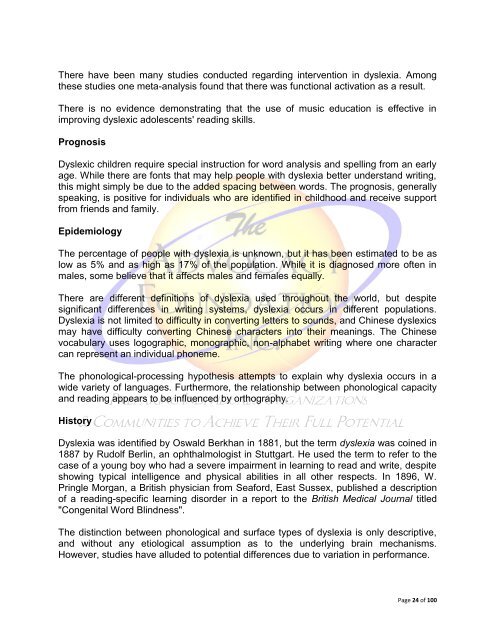Overcoming Dyslexia
Overcoming Dyslexia
Overcoming Dyslexia
You also want an ePaper? Increase the reach of your titles
YUMPU automatically turns print PDFs into web optimized ePapers that Google loves.
There have been many studies conducted regarding intervention in dyslexia. Among<br />
these studies one meta-analysis found that there was functional activation as a result.<br />
There is no evidence demonstrating that the use of music education is effective in<br />
improving dyslexic adolescents' reading skills.<br />
Prognosis<br />
Dyslexic children require special instruction for word analysis and spelling from an early<br />
age. While there are fonts that may help people with dyslexia better understand writing,<br />
this might simply be due to the added spacing between words. The prognosis, generally<br />
speaking, is positive for individuals who are identified in childhood and receive support<br />
from friends and family.<br />
Epidemiology<br />
The percentage of people with dyslexia is unknown, but it has been estimated to be as<br />
low as 5% and as high as 17% of the population. While it is diagnosed more often in<br />
males, some believe that it affects males and females equally.<br />
There are different definitions of dyslexia used throughout the world, but despite<br />
significant differences in writing systems, dyslexia occurs in different populations.<br />
<strong>Dyslexia</strong> is not limited to difficulty in converting letters to sounds, and Chinese dyslexics<br />
may have difficulty converting Chinese characters into their meanings. The Chinese<br />
vocabulary uses logographic, monographic, non-alphabet writing where one character<br />
can represent an individual phoneme.<br />
The phonological-processing hypothesis attempts to explain why dyslexia occurs in a<br />
wide variety of languages. Furthermore, the relationship between phonological capacity<br />
and reading appears to be influenced by orthography.<br />
History<br />
<strong>Dyslexia</strong> was identified by Oswald Berkhan in 1881, but the term dyslexia was coined in<br />
1887 by Rudolf Berlin, an ophthalmologist in Stuttgart. He used the term to refer to the<br />
case of a young boy who had a severe impairment in learning to read and write, despite<br />
showing typical intelligence and physical abilities in all other respects. In 1896, W.<br />
Pringle Morgan, a British physician from Seaford, East Sussex, published a description<br />
of a reading-specific learning disorder in a report to the British Medical Journal titled<br />
"Congenital Word Blindness".<br />
The distinction between phonological and surface types of dyslexia is only descriptive,<br />
and without any etiological assumption as to the underlying brain mechanisms.<br />
However, studies have alluded to potential differences due to variation in performance.<br />
Page 24 of 100

















